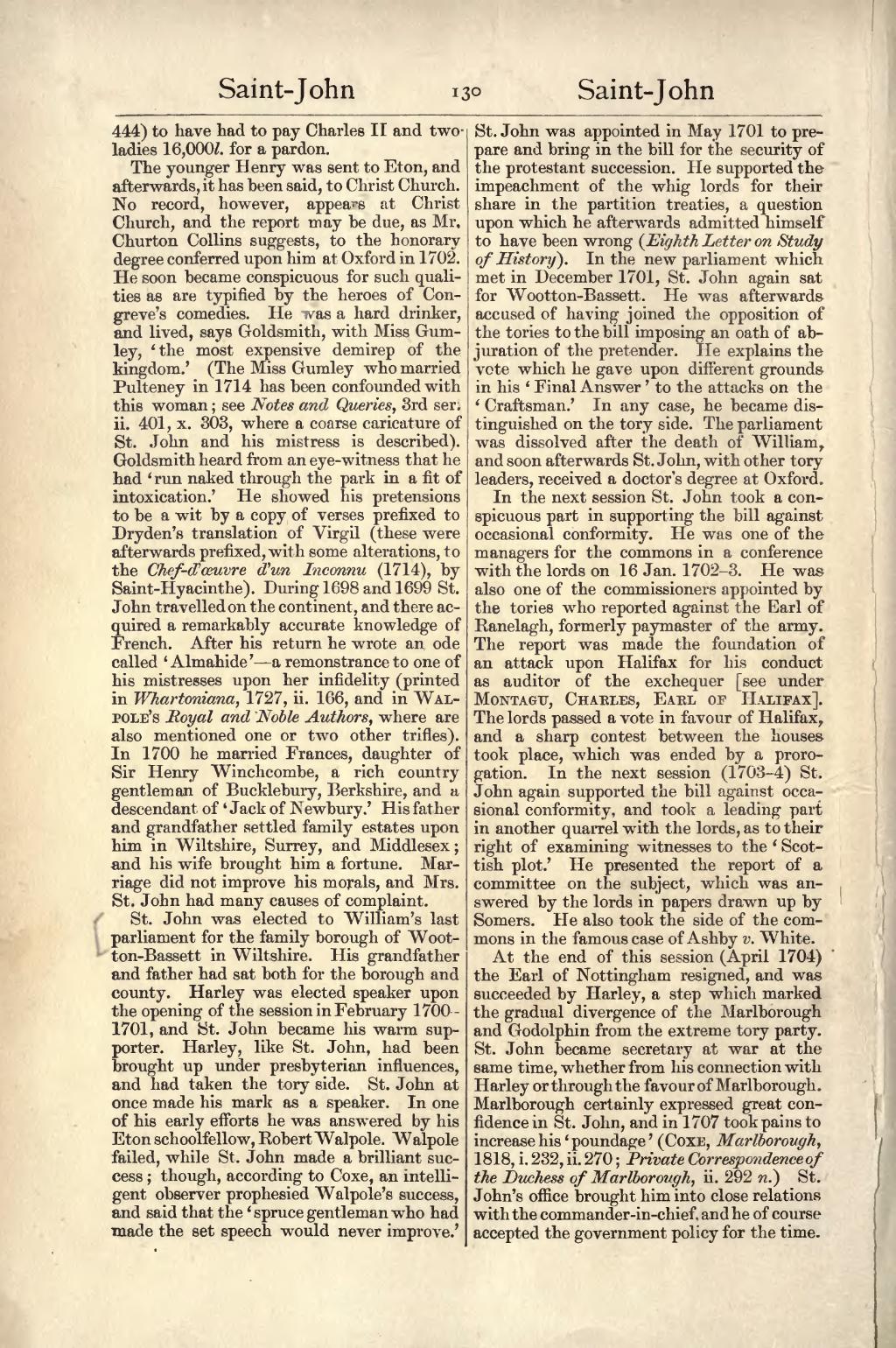444) to have had to pay Charles II and two ladies 16,000l. for a pardon.
The younger Henry was sent to Eton, and afterwards, it has been said, to Christ Church. No record, however, appears at Christ Church, and the report may be due, as Mr. Churton Collins suggests, to the honorary degree conferred upon him at Oxford in 1702. He soon became conspicuous for such qualities as are typified by the heroes of Congreve's comedies. He was a hard drinker, and lived, says Goldsmith, with Miss Gumley, ‘the most expensive demirep of the kingdom.’ (The Miss Gumley who married Pulteney in 1714 has been confounded with this woman; see Notes and Queries, 3rd ser. ii. 401, x. 303, where a coarse caricature of St. John and his mistress is described). Goldsmith heard from an eye-witness that he had ‘run naked through the park in a fit of intoxication.’ He showed his pretensions to be a wit by a copy of verses prefixed to Dryden's translation of Virgil (these were afterwards prefixed, with some alterations, to the Chef-d'œuvre d'un Inconnu (1714), by Saint-Hyacinthe). During 1698 and 1699 St. John travelled on the continent, and there acquired a remarkably accurate knowledge of French. After his return he wrote an ode called ‘Almahide’—a remonstrance to one of his mistresses upon her infidelity (printed in Whartoniana, 1727, ii. 166; see also Walpole's Royal and Noble Authors, where are also mentioned one or two other trifles). In 1700 he married Frances, daughter of Sir Henry Winchcombe, a rich country gentleman of Bucklebury, Berkshire, and a descendant of ‘Jack of Newbury.’ His father and grandfather settled family estates upon him in Wiltshire, Surrey, and Middlesex; and his wife brought him a fortune. Marriage did not improve his morals, and Mrs. St. John had many causes of complaint.
St. John was elected to William's last parliament for the family borough of Wootton-Bassett in Wiltshire. His grandfather and father had sat both for the borough and county. Harley was elected speaker upon the opening of the session in February 1700–1701, and St. John became his warm supporter. Harley, like St. John, had been brought up under presbyterian influences, and had taken the tory side. St. John at once made his mark as a speaker. In one of his early efforts he was answered by his Eton schoolfellow, Robert Walpole. Walpole failed, while St. John made a brilliant success; though, according to Coxe, an intelligent observer prophesied Walpole's success, and said that the ‘spruce gentleman who had made the set speech would never improve.’ St. John was appointed in May 1701 to prepare and bring in the bill for the security of the protestant succession. He supported the impeachment of the whig lords for their share in the partition treaties, a question upon which he afterwards admitted himself to have been wrong (Eighth Letter on Study of History). In the new parliament which met in December 1701, St. John again sat for Wootton-Bassett. He was afterwards accused of having joined the opposition of the tories to the bill imposing an oath of abjuration of the pretender. He explains the vote which he gave upon different grounds in his ‘Final Answer’ to the attacks on the ‘Craftsman.’ In any case, he became distinguished on the tory side. The parliament was dissolved after the death of William, and soon afterwards St. John, with other tory leaders, received a doctor's degree at Oxford.
In the next session St. John took a conspicuous part in supporting the bill against occasional conformity. He was one of the managers for the commons in a conference with the lords on 16 Jan. 1702–3. He was also one of the commissioners appointed by the tories who reported against the Earl of Ranelagh, formerly paymaster of the army. The report was made the foundation of an attack upon Halifax for his conduct as auditor of the exchequer [see under Montagu, Charles, Earl of Halifax]. The lords passed a vote in favour of Halifax, and a sharp contest between the houses took place, which was ended by a prorogation. In the next session (1703–4) St. John again supported the bill against occasional conformity, and took a leading part in another quarrel with the lords, as to their right of examining witnesses to the ‘Scottish plot.’ He presented the report of a committee on the subject, which was answered by the lords in papers drawn up by Somers. He also took the side of the commons in the famous case of Ashby v. White.
At the end of this session (April 1704) the Earl of Nottingham resigned, and was succeeded by Harley, a step which marked the gradual divergence of the Marlborough and Godolphin from the extreme tory party. St. John became secretary at war at the same time, whether from his connection with Harley or through the favour of Marlborough. Marlborough certainly expressed great confidence in St. John, and in 1707 took pains to increase his ‘poundage’ (Coxe, Marlborough, 1818, i. 232, ii. 270; Private Correspondence of the Duchess of Marlborough, ii. 292 n.). St. John's office brought him into close relations with the commander-in-chief, and he of course accepted the government policy for the time.
